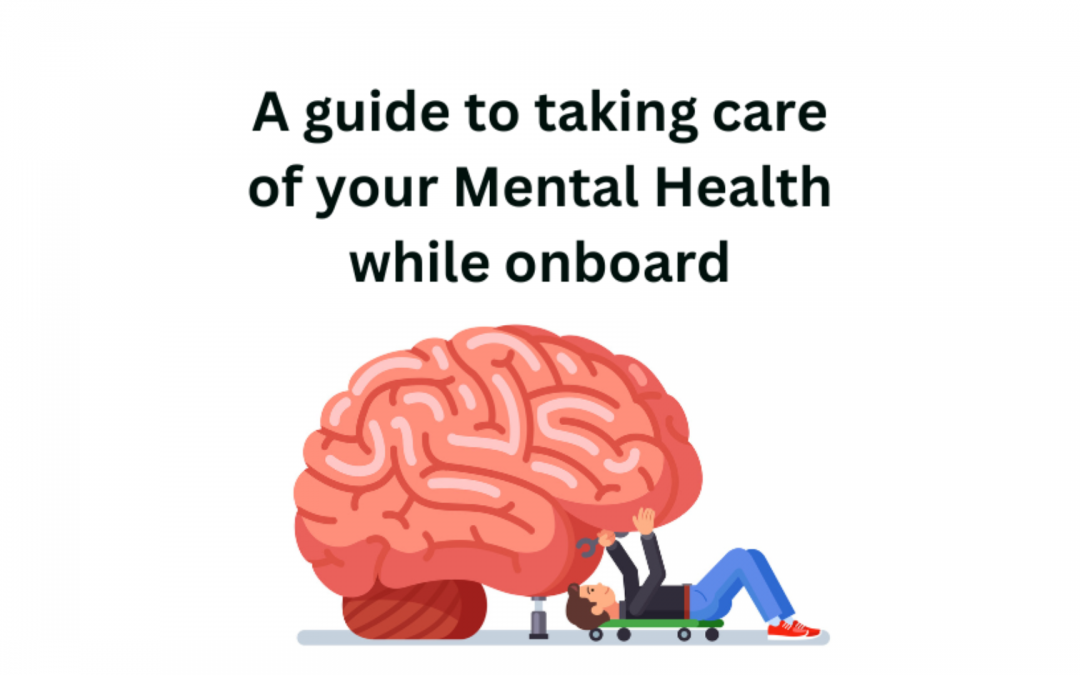We all understand how important it is to keep our bodies healthy. Even though the understanding around mental health is improving in modern society, there is still a lot of work to be done in helping the general public understand that mental health is just as important as physical health.
There are several factors that can impact seafarers’ mental health; such as job stress, family pressures, limited shore leave and more. However, help is out there! Living the maritime life also means spending months at sea during long voyages also means less physical human contact, and this can affect ones morale and mental well-being. To fight these, one needs to strengthen their mental health. It’s vital that we all look out for one another on board.
Body & Self Care – Taking good care of our physical body means we will be better able to cope with emotional problems. Eat healthily and regularly exercise, preferably in an outside/natural space. Plan how to make best use of rest times. Beware of how things like alcohol, drugs, smoking and caffeine affect you. These substances can affect the way your brain feels and works, harming your ability to think, feel, create, and even make decisions. Eating healthy is important.
Achieve – Our brain gets a boost when we achieve things during the day. Achievement increases the neurotransmitter dopamine and purposeful activity increases serotonin. It is helpful to plan realistic and achievable goals every day, such as those concerning work, and chores.
Get enough sleep – Make a concerted effort to go to sleep early at a regular time. Sleep is linked with numerous health-related consequences, both physical and mental. While some psychological or psychiatric issues may cause sleep problems, not getting enough sleep itself can also exacerbate pre-existing conditions such as depression, stress and anxiety.
Keep active – Exercise or other physical activity impacts both one’s body and one’s mind. Keeping active, whether it’s playing sport, going for long walks or running, practicing yoga, going to the gym, will help lower stress and anxiety levels, as well as help you improve your self-esteem. If you struggle, try motivating yourself by running with a friend or listening to your favourite music/podcasts.
Connect with other people – Working at sea means limited opportunities to communicate with your family and friends back home. But it’s essential to stay connected with them through regular phone calls or video calls.
Also, take the opportunity to socialize and make friends with other crew members. Schedule fun activities with them, like games, sports, or movie nights. If not, why not plan a range of regular activities to enjoy with crew mates such as: deck BBQs, game evenings, team sports, movie nights and karaoke contests.
Feeling overwhelmed? Take a step back and breathe. Allow yourself to pause and relax. Take deep breaths to calm down. Tell yourself, “I choose to see this challenge as an opportunity,” or “I have done this before, and I can do it again.” Acknowledge that feelings of anxiety, sadness, and anger are normal, but they will pass eventually. You can write down encouraging statements so that you can go back to them when you need a reminder and maintain a positive attitude. Free your mind from worry.
- Actively set yourself some time to do something you enjoy like reading, photography or even admiring nature
- Set yourself an exciting, fun new challenge
- Journaling and writing
- Laugh and interact with the crew on board
- Dance/Listen to music or playing an instrument
Step Back – When we have a problem we can get caught up in the emotion (anger, frustration, sadness) – it is difficult to think clearly and see the bigger picture at those times and we can react by doing things that are unhelpful. At stressful times, we can step back to think calmly, analyze and then act or react to the situation.
Asking Help – Everyone needs help from time to time. There is NOTHING wrong with seeking help for your mental health and wellbeing. Whether you just want to confide in a trusted friend or feel the need to engage the services of a professional, seeking help if you need it is the smart, mature, healthy thing to do.
Seek for help via the toll-free helpline numbers which are available on board which allow the crew member to remain anonymous or one can also write an email. Immediate assistance is provided since it is essential for people at sea to remain calm during emergencies like turbulent weather etc. Over-all health of a person is important and so mental health is as important as physical health since they go hand-in-hand for every person which enhances in efficiency at work and helps maintain a balance between personal and professional lives for seafarers.






